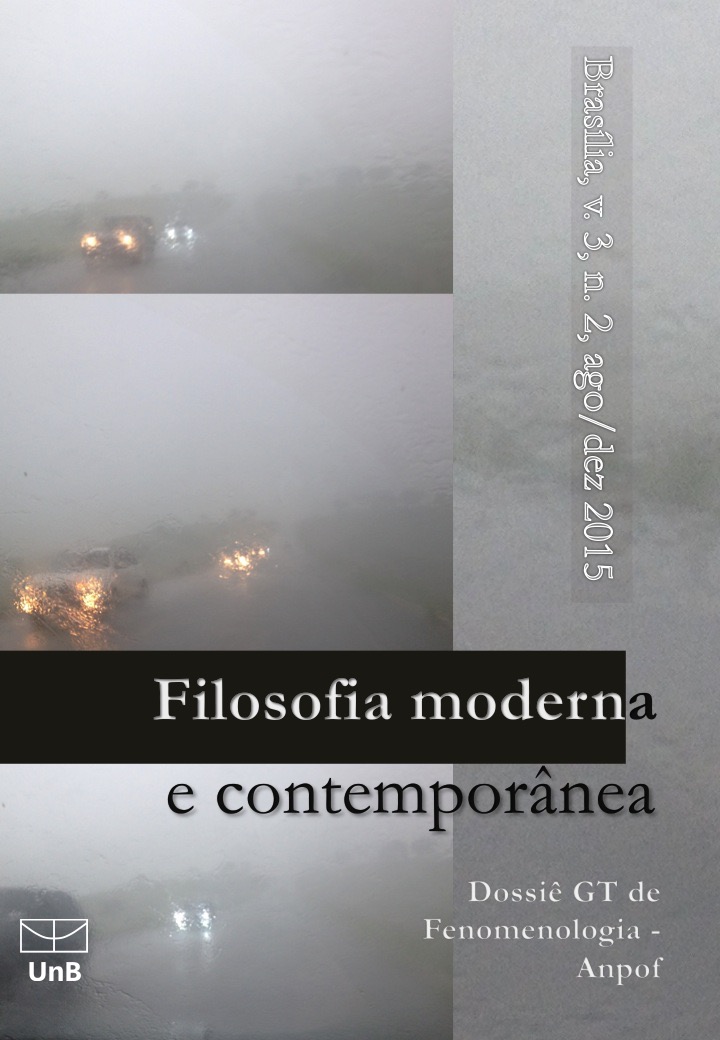The influence of Twardowski's concept of content in the theory of intentionality of Husserl
DOI:
https://doi.org/10.26512/rfmc.v3i2.12508Keywords:
Edmund Husserl, Phenomenology, Kazimierz Twardowski, IntentionalityAbstract
In Logical Investigations (1900/1901), Husserl claims that the epistemological foundation of pure logic requires a certain theory of intentionality, in which is distinguished act, content and object. This conception is inspired by the work of Kazimierz Twardowski, On the Content and Object of Presentations (1894). Husserl accepts Twardoswski’s position, according to which the content intermediate the relation between the act and the object. But Husserl, by virtue of his antipsychologism, reworks Twardowski’s theory, assuming that the meaning is an ideal content and not a psychic one. This brings the problem, in Logical Investigations, of the apprehension of ideal meaning by a real subject, a problem which finds its solution in the theory of instantiation.
Downloads
References
BOER, T. D. The development of Husserl's thought. The Hague; Boston: Nijhoff, 1978.
BRENTANO, F. C. Psychologie vom empirischen Standpunkt. Leipzig: Verlag von Duncker & Humblot, 1874.
CAVALLIN, J. Content and object : Husserl, Twardowski, and psychologism. Dordrecht; Boston: Kluwer Academic, 1997.
HUSSERL, E. Logische Untersuchungen 1: Prolegomena zur reinen Logik. Halle a/S.: Niemeyer, 1900.
HUSSERL, E. Investigações lógicas. Segundo Volume. Par te I, Investigações para a fenomenologia e a teoria do conhecimento (P. M. S. Alves & C. A. Morujão, Trans.). Lisboa: Centro de filosofia da Universidade de Lisboa, 2012.
HUSSERL, E. Investigações lógicas. Segundo Volume. Par te II, Investigações para a fenomenologia e a teoria do conhecimento (C. A. Morujão, Trans.). Lisboa: Centro de filosofia da Universidade de Lisboa, 2007.
HUSSERL, E. Investigações Lógicas: Prolegômenos à Lógica Pura. Rio de Janeiro: Forense universitária, 2014.
LOCKE, J. An essay concerning human understanding. Oxford: Clarendon Press, 1975.
PORTA, M. A. G. Un análisis del opúsculo de Kasimir Twardowski. Síntese (Belo Horizonte), 34, 261-282, 2007.
TWARDOWSKI, K. Zur Lehre vom I n h a l t u n d G e g e n s t a n d d e r Vorstellung en : eine psychologische Untersuchung. Wien: A. Hölder, 1894.
TWARDOWSKI, K. Sobre a doutrina do conteúdo e do objeto das representações. In C. BRAIDA (ed.),Três aberturas em ontologia: Frege, Twardowski, Meinong (pp. 43-90). Florianopolis: Rocca Brayde, 2005.
Downloads
Published
How to Cite
Issue
Section
License
Copyright for articles published in this journal is retained by the authors, with first publication rights granted to the journal. By virtue of their appearance in this open access journal, articles are free to use, with proper attribution, in educational and other non-commercial settings.


